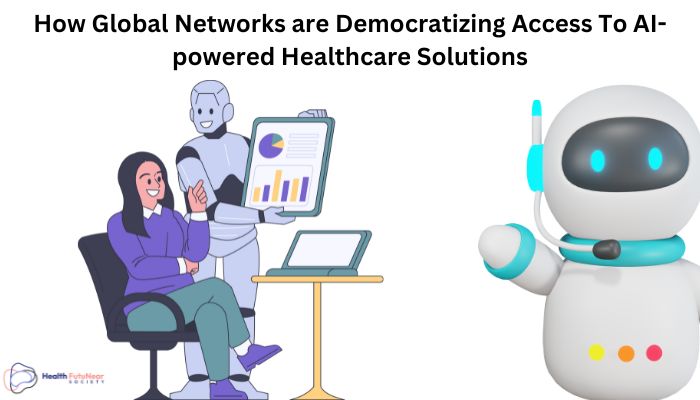
The emergence of artificial intelligence (AI) is radically transforming the healthcare landscape. From automating tasks to aiding in diagnosis and treatment planning, AI-powered healthcare solutions hold immense potential and promise to improve patient outcomes and healthcare delivery. However, a critical challenge remains: ensuring equitable access to these innovations. This is where global networks, like the Health FutuNear Society, come into play.
By breaking down geographical barriers and encouraging collaboration, they are playing an instrumental role in democratizing access to AI-powered healthcare solutions.
Table of Contents
The Power Of AI In Healthcare
Artificial intelligence (AI) injects a robust set of capabilities into the healthcare arena, fundamentally transforming how we diagnose, treat, and manage diseases. Machine learning algorithms act as tireless assistants, meticulously scrutinizing vast troves of medical data. This data can include patient medical records, imaging scans, genetic information, and even clinical trial results. By sifting through these immense datasets, AI can identify complex patterns and trends that might elude even the most experienced human diagnosticians.
This newfound potential to analyze vast amounts of data translates into several tangible benefits for patients and healthcare professionals alike.
- Enhanced Diagnostic Accuracy: AI excels at analyzing medical images, such as X-rays, CT scans, and mammograms. By ingesting and analyzing millions of these images, AI algorithms can learn to recognize subtle abnormalities with incredible accuracy. This translates to earlier detection of diseases, leading to more timely intervention and potentially improved patient outcomes.
- Personalized Treatment Plans: AI’s ability to interpret a patient’s complete medical picture, encompassing their medical history, genetic makeup, and current condition, empowers healthcare professionals to create personalized treatment plans. By factoring in these individual variations, AI can help tailor treatment approaches to maximize effectiveness and minimize side effects for each patient.
- Streamlined Workflow And Increased Efficiency: Healthcare professionals are often burdened by administrative tasks and time-consuming data analysis. AI can automate many of these repetitive processes, freeing up valuable time for doctors, nurses, and other healthcare providers. This enables them to focus on what matters most: delivering high-quality patient care and building meaningful relationships with their patients.
- Revolutionizing Drug Discovery And Development: The traditional drug discovery process is often slow and expensive. AI offers a powerful tool to accelerate this process. By analyzing massive datasets of clinical trials, genetic information, and protein structures, AI can identify potential drug targets and predict how they might interact with the human body. This newfound ability has the potential to significantly lower the time and cost associated with bringing new drugs to market, ultimately leading to faster development of life-saving treatments.
The Challenge Of Accessibility
Despite the promising potential of AI in healthcare, a significant barrier to its widespread adoption is accessibility. Here’s why:
- Cost: Developing and implementing AI-powered solutions can be expensive, making them unattainable for resource-limited healthcare institutions.
- Data Security And Privacy: AI algorithms rely on large datasets of medical data. It is paramount to ensure the security and privacy of this sensitive data is paramount.
- Lack Of Infrastructure: Many regions lack the necessary infrastructure, such as reliable internet connectivity and computing power, to support AI-powered solutions.
Global Networks – Breaking Down Barriers
Global networks of healthcare institutions, researchers, and tech companies are playing a crucial role in democratizing access to AI-powered healthcare solutions. Here’s how:
- Resource Sharing: Networks can facilitate the sharing of resources, such as expertise, data, and computational power. This allows resource-limited institutions to leverage the capabilities of more advanced partners.
- Collaborative Development: Networks can stimulate collaboration between AI developers and healthcare professionals. This ensures that AI solutions are designed to address real-world healthcare challenges and meet the specific needs of diverse populations.
- Open-Source Initiatives: Open-source platforms allow for the sharing of AI algorithms and code. This promotes transparency and enables developers in all parts of the world to contribute to and adapt AI solutions for their local contexts.
- Standardization And Regulation: Networks can advocate for standardized data formats and ethical guidelines for AI development in healthcare. This ensures data compatibility and promotes trust in the technology.
Examples Of Network-Driven Initiatives
Several global initiatives are already demonstrating the power of networks in democratizing access to AI-powered healthcare solutions:
- The World Health Organization’s (WHO) Global Digital Health Network connects healthcare professionals and institutions worldwide to share knowledge and best practices on using AI in healthcare.
- The Consortium For Affordable Medical Technologies (CAMTech) develops and disseminates low-cost, AI-powered diagnostic tools for use in resource-limited settings.
- The Partnership On AI brings together stakeholders from industry, academia, and civil society to develop responsible AI guidelines for the healthcare sector.
The Future Of AI In Healthcare
The future of AI in healthcare is undeniably collaborative. By leveraging global networks, we can ensure that these robust tools are not limited to a select few but reach the patients who need them the most. Here are some key areas for future collaboration:
- Developing AI solutions specifically tailored to the needs of low- and middle-income countries.
- Building robust data privacy and security frameworks to ensure responsible AI development.
- Investing in infrastructure development to connect the digital divide in healthcare.
Conclusion – A More Equitable Healthcare Landscape
Global networks, like the Health FutuNear Society, are a driving force towards a more equitable healthcare landscape. By democratizing access to AI-powered healthcare solutions, we can empower healthcare professionals around the world to deliver better care to their patients. This collaborative approach holds the potential to radically transform healthcare delivery, elevate patient outcomes, and ultimately, create a healthier future for all.



